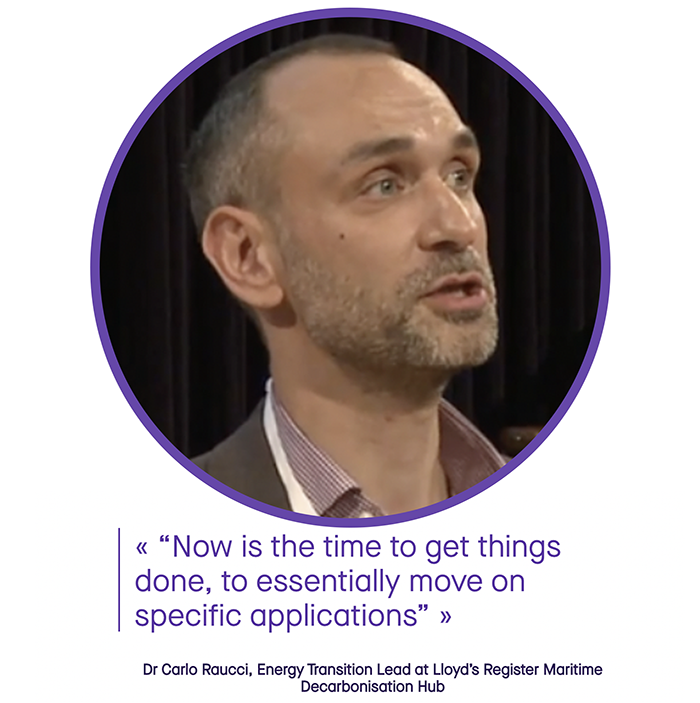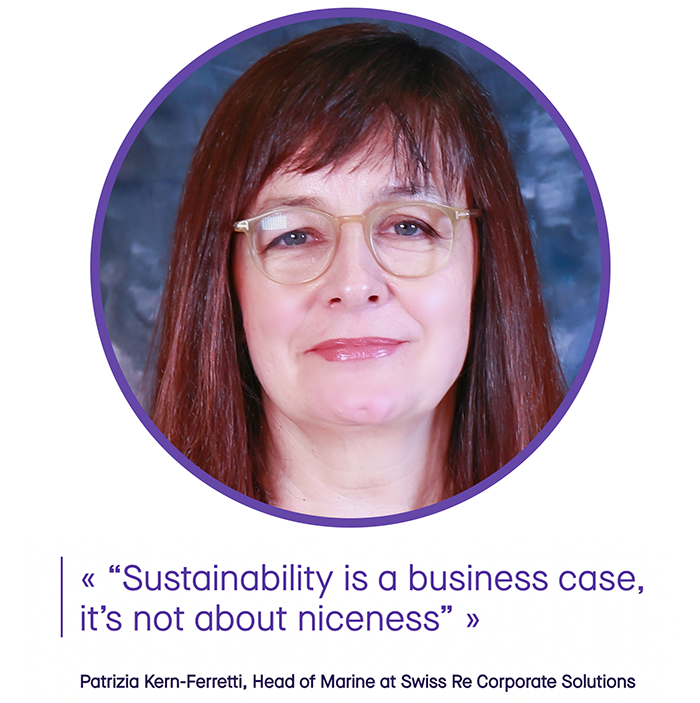Earlier this year, Accelleron hosted a media event at the Royal Institute in London, with industry experts taking part in presentations, discussions and a Q&A based on the topic of ‘Turbocharging Sustainability in Shipping’.
There was plenty to take away from the event, including a look at turbocharger platforms and upgrades, and the value of collaboration and co-creation when it comes to sustainability, but the event kicked off with a couple of presentations that drilled down into sustainability itself, focussing on ‘Shipping Decarbonization’ and ‘Sustainability and Poseidon Principles’.
Dr Carlo Raucci, Energy Transition Lead at Lloyd’s Register Maritime Decarbonisation Hub, was the first panellist to present, introducing his presentation on Shipping Decarbonization. Dr Raucci started his talk by discussing the Maritime Decarbonisation Hub, which was founded in 2020 to help work towards safe, sustainable pathways to a zero-carbon maritime industry.
Despite the hub’s relatively recent formation, Dr Raucci pointed out that Lloyd’s Register has been working towards decarbonization for several years, introducing research on ‘Low Carbon Pathways 2050’ back in 2015.
Since then, the group has published a number of different papers, including ‘Zero Emission Vessels 2030: How do we get there?’ in 2017, ‘Zero-Emission Vessels: Transition pathways’ in 2019, ‘Techno-economic assessment of zero-carbon fuels’ in 2020, the ‘First Mover Framework’ in 2021 and ‘Port energy supply for green shipping corridors’ in 2022.
While this research has helped the industry to progress to where it is today, Dr Raucci pointed out that now, “there’s no more time to look at global trends in how fleets can decarbonize; now is the time to get things done, to essentially move on specific applications.”
With that very much in mind, Dr Raucci’s presentation moved onto the future for the maritime industry, highlighting the fact we currently have a dominant fuel source that’s no longer fit for purpose, and the need to embrace change to a new regime right now.
The next phase for decarbonization in the maritime industry, says Dr Raucci, will be scaling up, which needs to happen very quickly, followed by the final change in the transition, which is consolidation in the market towards a decarbonized system.
Dr Raucci’s presentation provides an insight into the challenges in achieving such a transition, along with possible solutions that we could see along the way.

Sustainability and Poseidon Principles for Marine Insurance
Dr Raucci’s introduction towards decarbonization in shipping offered great background for our second presentation of the day, which saw Patrizia Kern-Ferretti, Head of Marine at Swiss Re Corporate Solutions, talking about Sustainability and Poseidon Principles for Marine Insurance.
Kern-Ferretti began by introducing the concept of marine insurance, discussing its history and the fact that it’s been around for hundreds of years. “As I always say, not a lot has changed in the meantime,” Kern-Ferretti explained with a wry smile.
So where does sustainability come into marine insurance? “Sustainability is a business case, it’s not about niceness,” said Kern-Ferretti. “Swiss RE is one of the leaders in sustainability in insurance – our first sustainability report dates back to 1979, and this has a lot to do with our Swiss DNA around social responsibility.”
Patrizia talked about the shipping industry’s desperate need to innovate, along with pressure for companies to move away from coal, oil and gas. This is why the Poseidon Principles exist, she said, providing a supporting framework for responsible marine insurance.
The Poseidon Principles aim to create common, global baselines that are consistent with and supportive of society’s goals to better enable insurers to align their portfolios with responsible environmental impacts.

As part of her presentation, Kern-Ferretti discussed how the Poseidon Principles work and are assessed, and how they can help the entire marine industry to meet decarbonization targets over the coming decades.
While Dr Carlo Raucci and Patrizia Kern-Ferretti’s presentations offer a fantastic introduction to the media event at the Royal Institute, it’s definitely just the beginning. Stay tuned, as we’ll be covering the other presentations in the near future.














